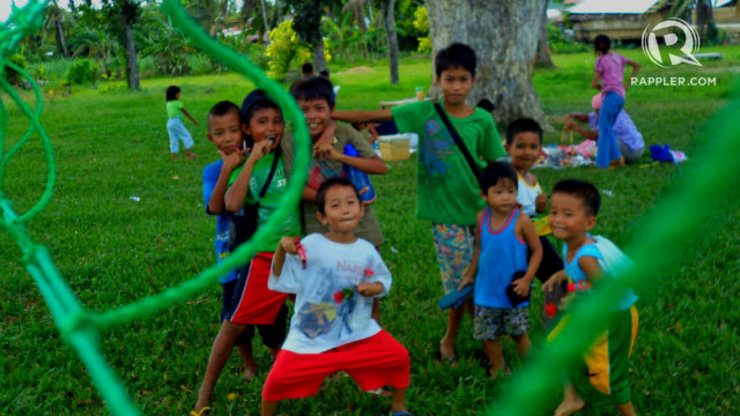SUMMARY
This is AI generated summarization, which may have errors. For context, always refer to the full article.

MANILA, Philippines – United for healthier kids.
Imagine a country where everyone is trying to eliminate undernutrition. Is it possible?
The Philippines is home to some of the world’s most stunted and most wasted children. In short, there are several Filipino children who are either too short for their age or too thin for their height. The problem lies not only in food insecurity and poverty, but also in the lack of proper information on childcare.
These childhood problems can lead to more serious – and sometimes irreversible – complications during adulthood.
The country’s hunger problem calls for all stakeholders – the government, non-governmental organizations (NGOs), the private sector, and the media – to come together to empower and enable families to live healthier lives.
To address the problem of child undernutrition, as well as misinformation, the United for Healthier Kids (U4HK) was launched in October 2014. The campaign was initiated by Nestlé Philippines, in partnership with the Food and Nutrition Research Institute of the Department of Science and Technology (FNRI-DOST), Facebook, ABS-CBN, alongside other media partners.
The campaign targets both parents and children. “U4HK aims to broaden parents’ awareness on nutrition,” said John Miller, Nestlé Philippines chairman and CEO. “The solution is in their hands, we encourage them to adopt healthier lifestyles.”
Miller added that the food and beverage industry also has a role to play in encouraging better nutrition not only by manufacturing healthier products, but also by raising awareness.
U4HK recently completed a nationwide caravan across 24 barangays. The caravan educated families on proper nutrition and meal preparation. In addition, U4HK produced TV commercials and an online campaign, garnering support from tech-savvy parents.
“Each one of us has a responsibility to ensure that children have the opportunity to grow to achieve their full potential for their families and as members of society,” Miller said. “United, we can do so much to nurture generations of Filipino families, who are at the very core of a strong and prosperous nation.” (READ: PH loses trillions to malnutrition)
Media’s role
There is irony in the everyday lives of Filipinos. While several poor households do not have enough food on their plates, almost all Filipino homes are equipped with television sets.
The media is indeed everywhere, making it a useful tool for education if used wisely.
ABS-CBN President and CEO Charo Santos-Concio recognized the media’s role in raising awareness about nutrition, “An eye-opening campaign such as this will undoubtedly have an effect in ensuring a healthier Philippines.”
The campaign also took advantage of social media and its wide reach. U4HK’s website contains simple recipes which seek to teach parents creative ways “to derive the most nutritional value out of every peso spent on food.” It also features short animation and easy-to-understand infographics explaining basic health concepts, enticing children to appreciate both science and nutrition.
“Over 50,000 photos of children ages 4 to 12 were uploaded on U4HK’s Facebook page in just 7 weeks,” said Sandra Puno, Nestlé Philippines director of communications. On Facebook, parents were asked to submit photos of their children “as a sign of their commitment to nourish their children.”
 In December, U4HK revealed the faces of a boy and a girl which were digitally created through the combination of all the photos shared by parents on Facebook. The images were dubbed as the “Faces of the Future,” which are depicted on two sets of commemorative coins made by the Bangko Sentral ng Pilipinas. This will serve as the “physical representation of the Filipino child” used by U4HK.
In December, U4HK revealed the faces of a boy and a girl which were digitally created through the combination of all the photos shared by parents on Facebook. The images were dubbed as the “Faces of the Future,” which are depicted on two sets of commemorative coins made by the Bangko Sentral ng Pilipinas. This will serve as the “physical representation of the Filipino child” used by U4HK.
Earlier this year, Senator Grace Poe delivered a privilege speech stressing the need for stronger governmental support regarding school children’s health. Poe’s advocacy inspired netizens to speak up on the issue as well.
And just last month, a series of media reports on the poor health conditions of street children prompted Senators Cynthia Villar and Mirriam Defensor-Santiago to propose resolutions ensuring the welfare of street kids.
These show how different sectors can work together in trying to solve problems such as hunger.
Rappler, which also supports the U4HK campaign, launched the #HungerProject in March in collaboration with the World Food Programme and the Department of Social Welfare and Development. The #HungerProject is an online platform featuring stories told by farmers and fisherfolk, health professionals and advocates, NGOs, parents and children, among many other voices.
The #HungerProject looks at the causes and effects of hunger, and how it also relates to education, economy, environment, governance, gender, agriculture, and basically, human rights.
With the help of a community of health advocates, campaigns such as U4HK and the #HungerProject share practical solutions to hunger. They seek to inspire not only families, but also local governments and policymakers in ensuring that no Filipino gets left behind. – Rappler.com
You may watch U4HK’s videos on its YouTube account.
Do you know of other campaigns which help fight hunger? Share them with us. E-mail your stories and ideas to move.ph@rappler.com and be part of the #HungerProject. You can also join our Facebook group.
Add a comment
How does this make you feel?
There are no comments yet. Add your comment to start the conversation.